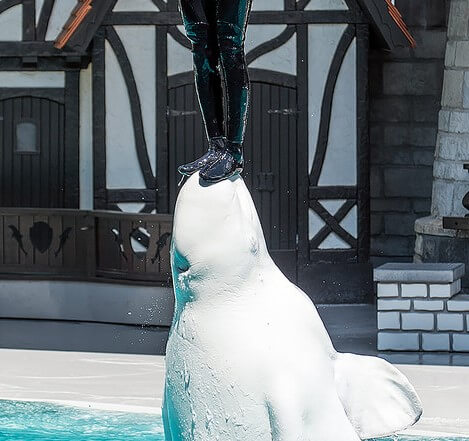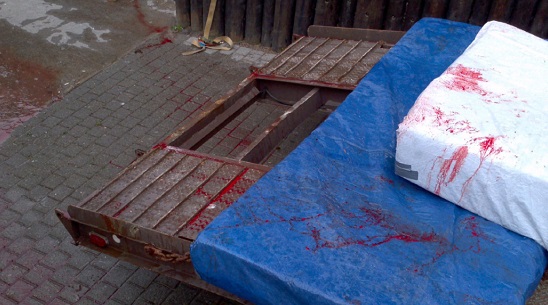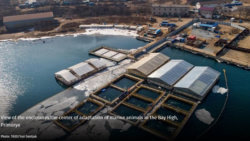Charmin & Tofino and the End of the “Whale Jail”

In April 2012, staffers set out to move beluga whales Tofino and Charmin from one of the concrete pools at Marineland of Canada to another. The result, as documented by the Toronto Star, was something of a bloody mess.
Both belugas had been captured from the Sea of Okhotsk in Russia – Charmin in 1999 and Tofino in 2004 – and were being moved from the park’s Friendship Cove, where tourists can watch the whales through underwater windows, to the main display pool, the King Waldorf Stadium, where the whales perform.
The move involved driving each of the whales on a flatbed truck from one pool to the other and then lifting them from the truck into the pool.
During Charmin’s move, the crane that would be lifting her in a sling over to the pool jammed, and she was stuck on the flatbed, her tail thrashing against the metal slats and edges of the trailer, according to former senior trainer Phil Demers, who was helping in the move.

Photo by Marineland staff and the Toronto Star
“It was one of the worst days of my life,” Demers told the Star. “It went on for at least an hour. . . . There was blood on Charmin, on the ground, on the side of the pool, on the pads — it was sprayed all over.
“The worst, though, was that she lay there all that time with the pressure of her heavy weight (about 1,350 kilograms) on her internal organs — so bad.”
Demers said trainers insisted on putting an extra pad under her tail. Without it, he says the cutting would have been even worse.
A month later, Demers quit after 12 years because, he said, he could no longer “train animals that were sick and compromised.”
Charmin and Tofino are still performing at the King Waldorf Stadium.
Photo of Charmin in performance by Jennifer Stuber
Post Script: Whale Aid Russia and the end of the “whale jail”

The “whale jail” off the Far East coast of Russia. Photo by Izvestia.
At the time when Charmin and Tofino were captured from the Sea of Okhotsk, there was a thriving global trade in orcas and belugas being seized from their home waters off Russia’s far east coast and shipped to entertainment facilities around the world.
In 2018, the Russian media became aware of these largely secret operations, and as stories and photos of what was dubbed the “whale jail” spread through international media, vigorous protests erupted at home and abroad.
In January 2019, the Whale Sanctuary Project approached the Russian government with a proposal to help return the 10 orcas and 87 beluga whales who were being held at the whale jail to their home waters.
The government accepted our offer, and the story of Whale Aid Russia, the largest whale rescue program in history – and the ensuing ban on such captures – is told here.